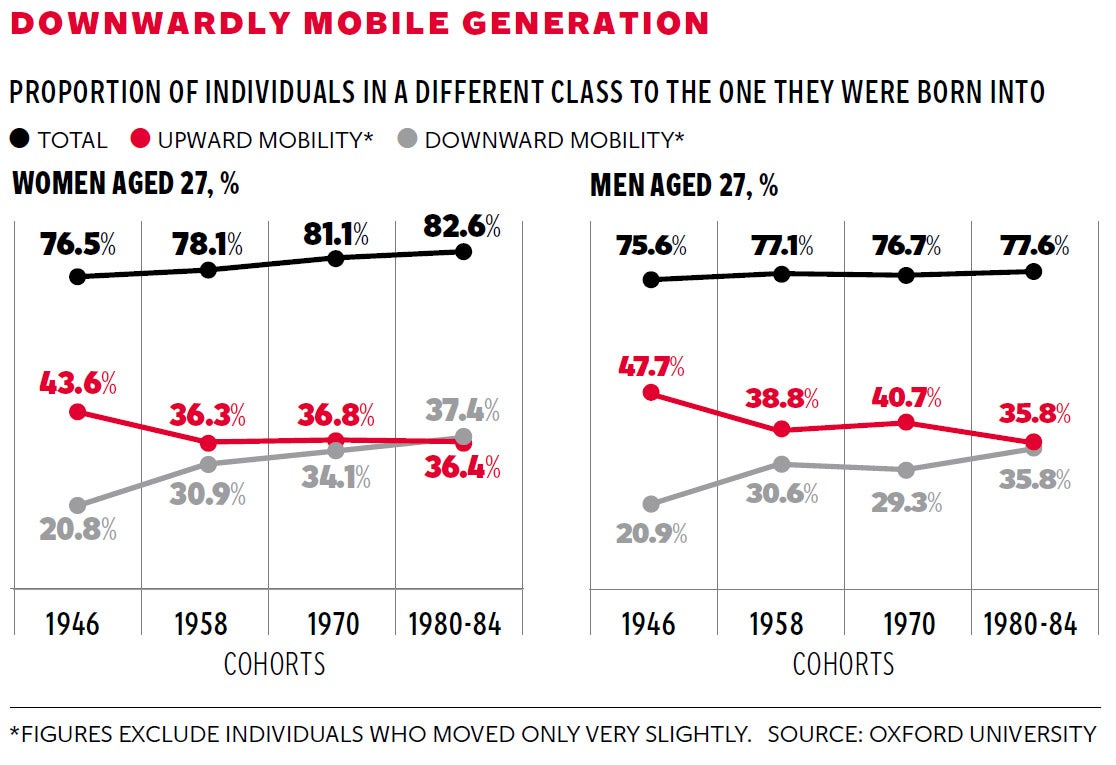Downward mobility on the rise for the first time in generations
Study claims there are more people originating in the professional classes - but less space

Your support helps us to tell the story
From reproductive rights to climate change to Big Tech, The Independent is on the ground when the story is developing. Whether it's investigating the financials of Elon Musk's pro-Trump PAC or producing our latest documentary, 'The A Word', which shines a light on the American women fighting for reproductive rights, we know how important it is to parse out the facts from the messaging.
At such a critical moment in US history, we need reporters on the ground. Your donation allows us to keep sending journalists to speak to both sides of the story.
The Independent is trusted by Americans across the entire political spectrum. And unlike many other quality news outlets, we choose not to lock Americans out of our reporting and analysis with paywalls. We believe quality journalism should be available to everyone, paid for by those who can afford it.
Your support makes all the difference.Young people are increasingly likely to slip down the social ladder as they enter adulthood because there is now so little room at the top of the best careers, a ground breaking study into social mobility in the UK has found.
Downward mobility – in which people find themselves in a lower social class than the one in which they were born – has been steadily rising for both men and women throughout the second half of the last century, it concluded.
Studying the fortunes of more than 20,000 Britons born in 1946, 1958, 1970 and 1980-84, academics at the University of Oxford found that the later in the century a person was born, the more likely they were to find themselves with a reduced social standing compared to their parents. Such a situation had “little historical precedent” and carried “potentially far-reaching political and wider social implications”, they wrote.
The reason for the difference in generations, they suggested, was that while people born in the 1940s and 50s had benefited from the sudden explosion of professional and managerial employment – or more room at the top – when they became adults, those belonging to the later cohorts entered a crowded professional job market and were often forced to accept lower-level positions.
“The people who benefited from these widening opportunities for upward mobility are the parents now,” said sociologist Dr John Goldthorpe, one of the study’s co-authors. “Over the later period, this expansion in top-end jobs has slackened off, so it’s their children who are now facing this much more difficult situation.
“It’s not that the risks of downward mobility have increased; it’s simply that there are more people at risk of being downwardly mobile – because there are more people originating in the professional and managerial classes than there were previously, and those classes are no longer expanding at the same rate.”

The researchers used the National Statistics Socio-Economic Classification (NS-SEC), in which individuals are sorted into one of seven social classes on the basis of their employment status and occupation. The seven classes range from “higher managers and professionals” at the top to “routine occupations” at the bottom.
The men and women from the 1946 cohort enjoyed an upward mobility rate of 47.7 per cent and 43.6 per cent respectively, while the downward mobility rate stood at just 20.9 and 20.8. But by the time of the 1970 cohort, the downward mobility rate had risen to 29.3 for men and 34.1 for women – before increasing again to 34.4 and 37.4 in 1980-84.
“Over the past four decades, the experience of upward mobility has become less common, and going down the social ladder has become more common,” said study co-author Erzsébet Bukodi, of the Department of Social Policy and Intervention at the University of Oxford.
However, the research also showed that fears of a long-term decline in social mobility were misplaced, with overall rates among men and women remaining roughly constant across the four cohorts. As a result, the researchers suggested that future political discussion about social mobility should instead focus on why people were falling down the ladder.
“This research ties in, accidentally, with some of the things that [Labour leader] Ed Miliband’s been saying – that we’re maybe coming up to the first generation for a long time whose social prospects on average are less favourable than those of their parents,” said Dr Goldthorpe.
The results of the study suggested that if the Government wanted to improve social mobility, it should do so through economic policies rather than focusing on education, he added. “This focus on educational policy does seem to me to be a bit misguided. What we really need is to try and increase the growth of top-end professional and managerial jobs. It’s no use having a growing proportion of young people with higher-level qualifications unless there’s the demand there on the employment side.”
A spokesperson for the Social Mobility and Child Poverty Commission, which advises the Government on the subject, said the research should act as a “wake-up call for politicians from all parties”.
“This study demonstrates the challenge facing the UK in improving social mobility – the problem is far greater than previously thought. It shows that a child from a middle-class background is up to 20 times more likely to get a professional job than one from a working-class background with little change in this over time,” they added.
The study is published today in the British Journal of Sociology.
Join our commenting forum
Join thought-provoking conversations, follow other Independent readers and see their replies
Comments